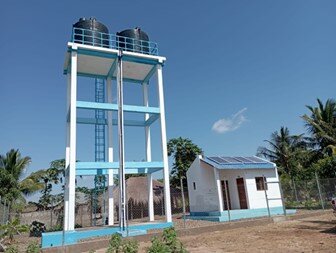The IDP Wash project (Improved Water, Sanitation and Hygiene Services for IDPs and their host families) in Cabo Delgado province, triggered by HELVETAS Mozambique is positively contributing to the creation of improved living conditions for thousands of people who are victims of terrorism, started in October 2017.
Funded by the United Nations Children's Fund (UNICEF), the IDP Wash project covers 11 communities in the Ancuabe district in Cabo Delgado and aims to contribute to increasing coverage and access to safe water and sanitation and promoting good hygiene practices for the well-being of the population. It is in this context that a Water Supply system was built in late 2021 in the host community of Marrupa, benefiting just over two thousand families.
It is the first water infrastructure in a concrete tower built in that community and has a water tank with a capacity of 10 thousand liters and is powered by electricity produced by solar panels. The community is committed to ensuring the maintenance and sustainability of the system through community contributions which fees will be set during the next meeting of the Water Supply Committee (CAS) composed by the majority of the local community members.
After the awakening prompted by HELVETAS Mozambique under the SANTOLIC approach, in the resettlement center of Chiúre-Velho, district of the same name, in Cabo Delgado, part of the residents of the Marrupa community started to build latrines and pantries by themselves, thus initiating concrete actions of Community Led Total Sanitation (SANTOLIC).

In a week, latrine coverage increased by 32%
The awakening is based on stimulating a collective sense of disgust and shame among community members as they are confronted with the raw facts of massive open-air fecalism. These are hands-on demonstration sessions of the transmission routes of waterborne and non-waterborne diseases, medical costs arising from poor sanitation practices in the environment, surveys of the amount of feces spread throughout the community due to open defecation, and visits to the places where community members defecate.
As a result of this reflection, household latrine coverage increased significantly to 32% within a week. One of the participants in the wake-up sessions under SANTOLIC, claimed to have built her latrine by herself to avoid consuming feces carried by flies and other insects that commonly inhabit the communities.
SANTOLIC is an integrated approach to achieving and maintaining "Open Feces-Free" (LIFECA) status. SANTOLIC involves facilitating community analysis of their sanitation profile, defecation practices and consequences, leading to collective action to become LIFECA.latrine coverage increased by 32%
The awakening is based on stimulating a collective sense of disgust and shame among community members as they are confronted with the raw facts of massive open-air fecalism. These are hands-on demonstration sessions of the transmission routes of waterborne and non-waterborne diseases, medical costs arising from poor sanitation practices in the environment, surveys of the amount of feces spread throughout the community due to open defecation, and visits to the places where community members defecate.
As a result of this reflection, household latrine coverage increased significantly to 32% within a week. One of the participants in the wake-up sessions under SANTOLIC, claimed to have built her latrine by herself to avoid consuming feces carried by flies and other insects that commonly inhabit the communities.
SANTOLIC is an integrated approach to achieving and maintaining "Community Open Defecation Free" status. SANTOLIC involves facilitating community analysis of their sanitation profile, defecation practices and consequences, leading to collective action to become LIFECA.

Project achievements (2021)
Water
- Built 2 new boreholes with AfriDev pump (Nankumi B);
- Rehabilitated 7 (2 Nicuita, Nanoa A, Nanhomane, 2 Meza headquarters)
- Built 1 solar water supply system (Nannona) (+1 in Marocane
- Rehabilitated Water Supply System in Ancuabe-Sede, including 1 new standpipe
- Created/rehabilitated 11 Water and Sanitation Committees.
- Distributed 2,850 water purifiers (Certeza);
- 3 boreholes with manual pump (Ngeue, Nathove, Cujupane communities)
- Rehabilitation of 2 AfriDev hand pumps in the Marocane Resettlement Center.
Sanitation
- Community sanitation (SANTOLIC) 11 communities,11,915 people.
- Produced and distributed 970 of concrete for the Marocane Resettlement Center);
- Built 66 latrines for people with disabilities.
- Built 78 emergency latrines with toilet (78 total)
Hygiene
- Promotion of preventive measures COVID-19 (community radio);
- Distributed 950 dignity and hygiene kits in Marocane;
- Produced and distributed 1,560 homemade masks.
- Support to the District Health, Women and Social Action Service in managing cholera outbreaks.

